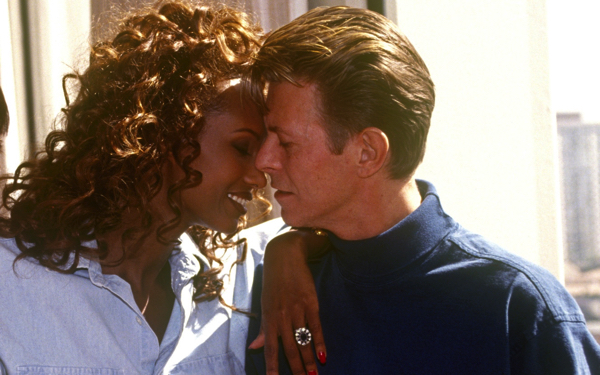Soon after David Bowie proposed to supermodel Iman in 1992, they attended a party in Midtown. Former Bowie backup singer and ex-flame Ava Cherry was there, and remembers the dazzling diamond that Iman flaunted.
“She said, ‘David and I are engaged. This is the ring he got me,’ ” Cherry told The Post. “She showed it off big-time. It was Iman telling me that David was her man.”
It was the start of a new New York life for the ever-changing Bowie, who had spent the 1970s and ’80s living the louche life: crashing like a tourist at the Sherry-Netherland and Gramercy Park hotels; flitting from Studio 54 to CBGB to druggy after-hours joint the Continental.
Settling down with Iman turned the rock star into a real, rooted New Yorker, as chronicled in “David Bowie: A Life” (Crown Archetype, out Sept. 12) by Dylan Jones. It also may have delayed his mortality — he reportedly got clean with her help.
But not long before the singer and the model got serious, he was still indulging in bad behavior. Psychologist Oliver James is quoted in the book as remembering a coke-dealer friend who “met Bowie in the early ’90s and [Bowie] Hoovered up huge amounts of coke, so much that my friend, who is kind of an expert on this stuff, said that he must have been doing some other drugs to protect him from the effect. If you took that amount of coke in one go, it could potentially kill you . . . This was just before Iman, of course.”
In 1999, after spending a few years in an apartment — complete with a panic room — on Central Park South, the couple moved to Nolita, where they would raise their daughter, Lexi, now 17, on Lafayette Street.
Photographer Ken Fischer, a former neighbor, told The Post that, about 10 or 11 years ago, his daughter was invited to Lexi’s birthday party. Fischer tagged along to Chez Bowie, which was actually a cottage on the building’s roof. “Bowie was very friendly, playing with my daughter and singing ‘Wheels on the Bus’ with her,” said Fischer. “It was surreal.”
The singer prowled the aisles of Soho bookstore McNally Jackson, drank double macchiatos at La Colombe, and hunted down new music at the now-closed Bleecker Bob’s.
“Bowie came into the store and Bob [Plotnik, the namesake owner] called him ‘Davie’ before putting on Bowie’s silliest song, ‘The Laughing Gnome.’ Bowie got embarrassed but loved it,” said J.K. Kitzer, Plotnik’s girlfriend. “Before touring with Nine Inch Nails [in 1995], Bowie bought lots of techno stuff.”
He even played nice with paparazzi. “He’d see me and strike a pose,” said lenser Ron Galella.

And Bowie wasn’t bothered by his neighbors. “People [in Manhattan] are very decent about their intentions with well-knowns,” he wrote in New York magazine in 2003. “I get the occasional ‘Yo, Bowie,’ but that’s about it.”
Well, there was one neighbor who bugged him. In the least rock-star move ever, Bowie complained to Courtney Love, who also lived at 285 Lafayette, about her stereo being too loud.
He still had his eccentric side, however. Bowie and his painter pal Damien Hirst considered buying a Greek island and, as is related in the book, “placing the embalmed body of a human volunteer [yet to be found] at the heart of a labyrinth, which they planned to construct.”
Bowie had a knack for seeking out smart, young collaborators and taking them under his wing. These included bass player Gail Ann Dorsey, who toured with him.
“Hanging out with him in New York was interesting,” she said, characterizing Bowie as a father figure. “We’d have lunch and spend most of the time talking about art and books; he remembered details to a mind-boggling degree. We sat outside at French Roast [a now-defunct brasserie in Greenwich Village] when the weather was nice.”
She remembers waking up in a Northampton, Mass., hotel room on the morning of Jan. 11, 2016, to the news that Bowie had passed away from liver cancer, a diagnosis he’d kept secret from almost everyone.
The death-hint lyrics of Bowie’s final album, “Blackstar,” which had been released a mere three days prior, and of “Lazarus” — the off-Broadway musical he’d co-written and which was running at the time of his death — suddenly made sense.
“They were his way of saying goodbye,” Dorsey said.

